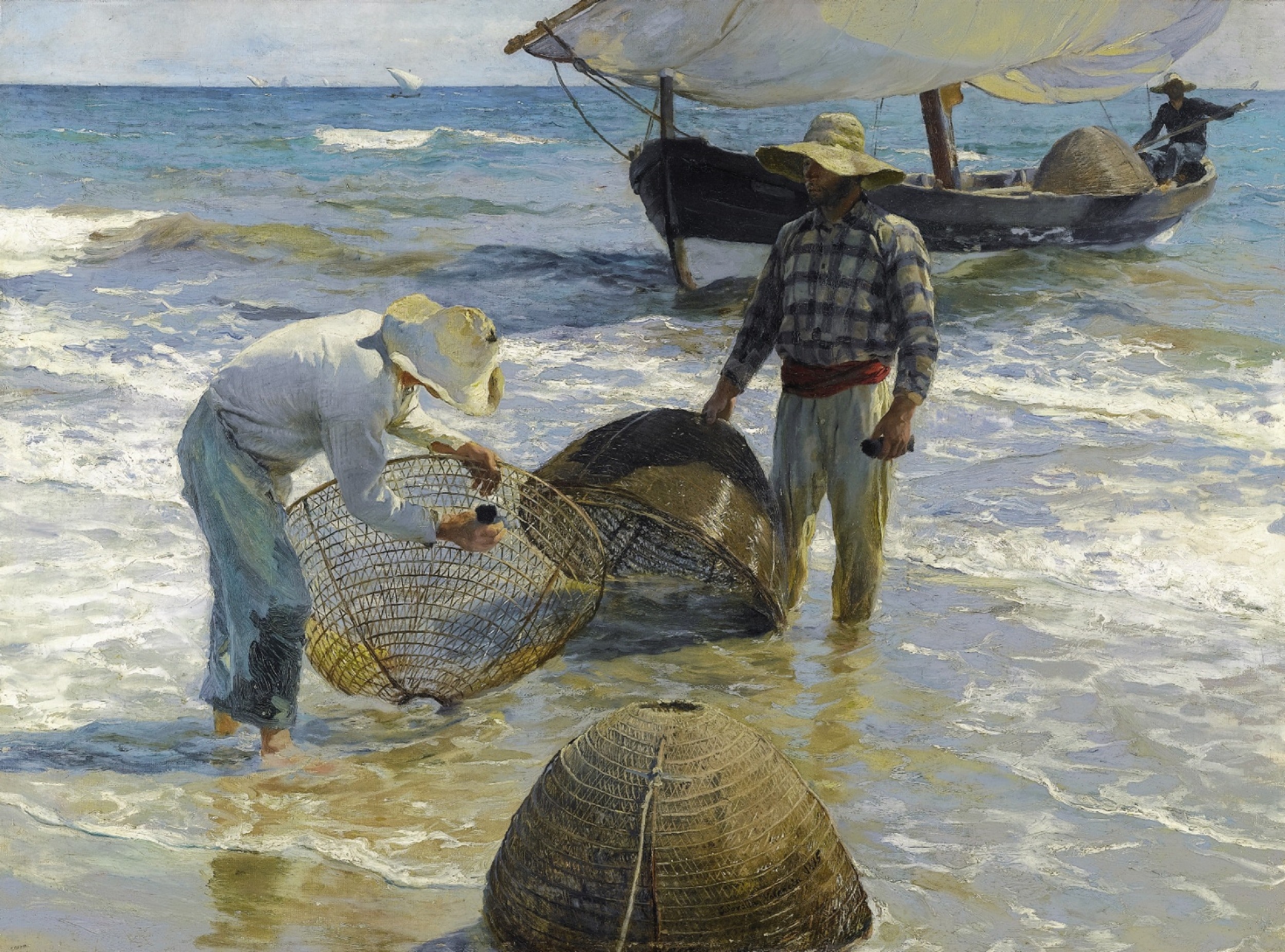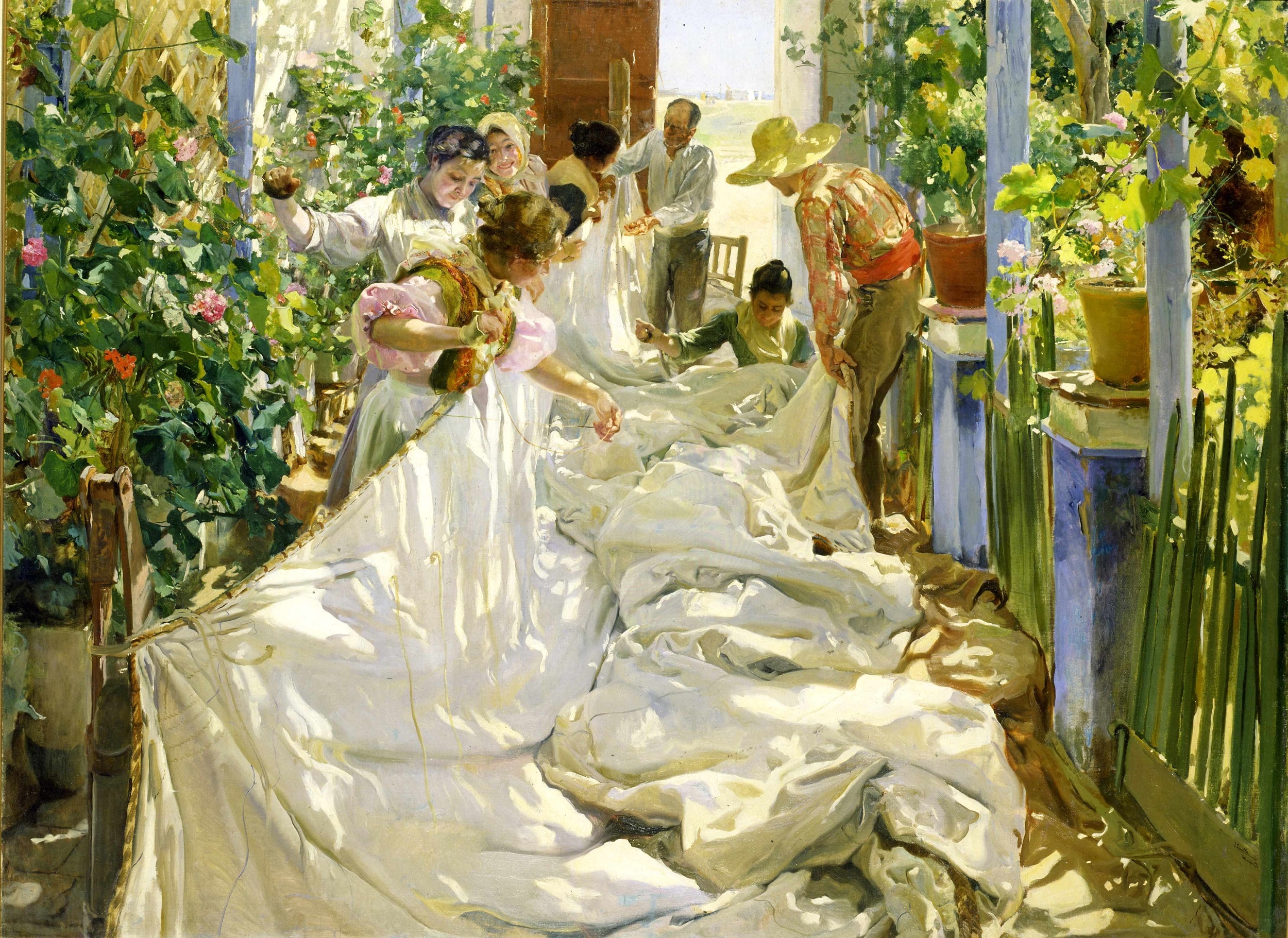On July 14, The musée des impressionnismes in Giverny will open an exhibition called "Sorolla and the Paris Years" which focuses on Joaquín Sorolla's rise to fame and international success.
 |
| Valencian Fishermen, 1895, 26 x 34 in. Collection Broere Charitable Foundation |
The exhibition brings together around 100 paintings, including many of the major landscapes, portraits and beach subjects. Like his contemporaries Anders Zorn, John Singer Sargent, and Peder Krøyer, Joaquín Sorolla was remarkable for bridging the gap between academic and impressionist painting.
He creating images informed by outdoor studies yet accurately drawn and thoughtfully composed.
For many of us who can't make it to see the exhibition, there's an excellent catalogue published by Skira/Rizzoli that puts Sorolla's work in context. Sorolla and the Paris Years is 248 pages long, with essays by Blanca Pons-Sorolla, Maria López Fernández and other scholars.
The cover shows a woman swathed in white, holding a camera.
 |
| Sorolla, Self Portrait |
The text emphasizes Sorolla's path to fame and commercial success. It was a remarkable achievement for an unknown Spanish artist to dominate the attention of collectors and museums in the art capitals of Paris and New York.
 |
| Sorolla, Sewing the Sail, 1896, oil, 87 x 118 inches, Fontazione Musei Civici di Venezia |
Unfortunately there's not much discussion of Sorolla's working methods or exactly how he used photography. This is something I've always wondered about, since many of his dynamic figural subjects would have been nearly impossible to paint entirely from observation on location.
The book and the exhibition contain many of Sorolla's famous large canvases. If you have other books on Sorolla, those images will repeat. The reproductions are excellent in this book, large, colorful and sharp, with some close-up details. The book's dimensions are 9.8 x 1 x 11.3 inches.
 |
| Sorolla, Surroundings of Paris, 1889, Oil on panel, 5 3/8 x 7 5/8 inches, Museo Sorolla |
What sets this book apart from others on Sorolla is a fine collection of his tiny plein-air studies, such as the one above, where you can clearly study the way he used a warm priming color.
----
Exhibition catalogue: Sorolla and the Paris Years
The exhibition in Giverny will be on view through November 6, after which it will continue to the Museuo Sorolla in Madrid from November 24 - March 19, 2017.








7 comments:
Master,
A simple question :
Do you have a favorite ?
Sargent, Sorolla, Zorn ?
We love all three, I know, but which Biography are close to you in your desk ?
:)
Paulo - Rio - Brazil
There are some photos around that show him on a beach, painting right in the open. No way to tell if that was for show or it had really been his preferred method.
That said, I wish I were in the vicinity to see the exhibition. :)
My favorite? Sorolla, of course :)
There´s a new book (in spanish) on Sorolla´s technique, including his use of photography. Nothing similar has been published before.
I´d say they´re planning a translation, but who knows how long that could take. Maybe the subtitles in the youtube link make some sense (you can skip the first part and go straight to the lady´s speech for the technical part).
http://ipce.mcu.es/pdfs/DossierSorolla.pdf
http://ipce.mcu.es/pdfs/PresentacionSorolla.pdf
https://www.youtube.com/watch?v=0P80FDc-Gzk
http://www.amazon.es/Joaqu%C3%ADn-Sorolla-T%C3%A9cnica-Art%C3%ADstica-Ventana/dp/8430968474
Jose, thanks for those valuable links.
Eugene, I've seen those photos, and I agree that they don't constitute proof that he painted the entire painting shown on location. While there's no doubt he painted many studies (and at least started many big paintings) on location, it seems logical to me that if he had a photographer there to shoot him painting, he'd say, "Hey, could you take a few shots of the motif, too?"
Nuum, It's like choosing my favorite month of the year. I like all three of them— and I refer to them—for different reasons.
I remember reading that he was an extremely fast painter, and it amazed those who watched him, and he also had some three foot brushes for those very large canvases! I'm not sure where the information came from, but if true, it would have been something to behold!
He used photography (the book I´ve cited documents examples on how he used it for the Hispanic Society paintings, among others), but it seems that he also painted complex moving subjects in big canvases directly from the motif, as documented by his american disciple Starkweather in 'EIGHT ESSAYS ON JOAQUIN SOROLLA Y BASTIDA':
Here Sorolla has shown
us wonderful studies of the children of the port at
play, as in the remarkable study of the boy hunting
mussels. (...) It was in the limpid waters of this
port that Sorolla undertook the solution of a problem
of the swirl of sun-pierced water about a human
figure. Of this subject he made several preliminary
studies, and then in four afternoons of brisk work pro-
duced his large canvas. The composition for this
picture vas scrawled on the side of his house in
charcoal while servants were busy stretching the big
canvas for the work. The picture was painted, of
course, directly from nature, the stretcher being tied
with ropes to some posts which had been arranged
temporarily on a ledge of rock, first chiseled smooth
for the purpose. Six urchins served in relays as
models, three swimming round and round for the
painter, while three rested and warmed themselves
in the sun.
I saw the Sorollo exhibit wednesday at a press preview.
Please scroll a little and then you can see my photos(200+)
The 50 sketches are first.
An astonishing exhibit well worth the teip over.
https://www.flickr.com/photos/parisbreakfast/
Post a Comment